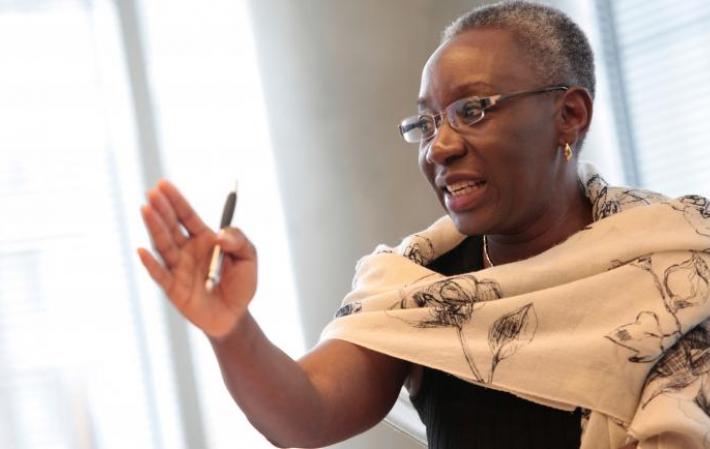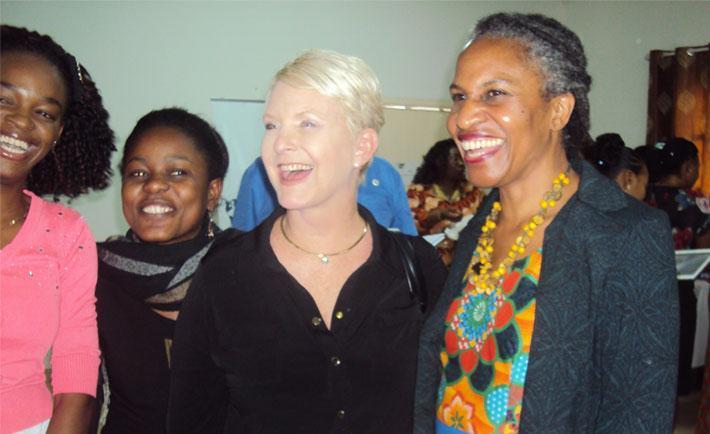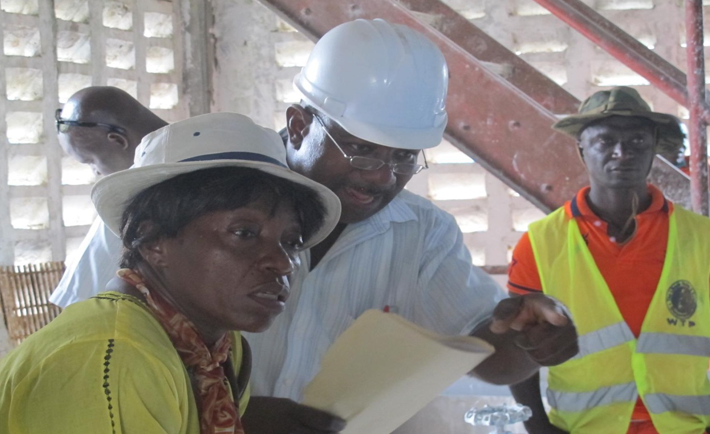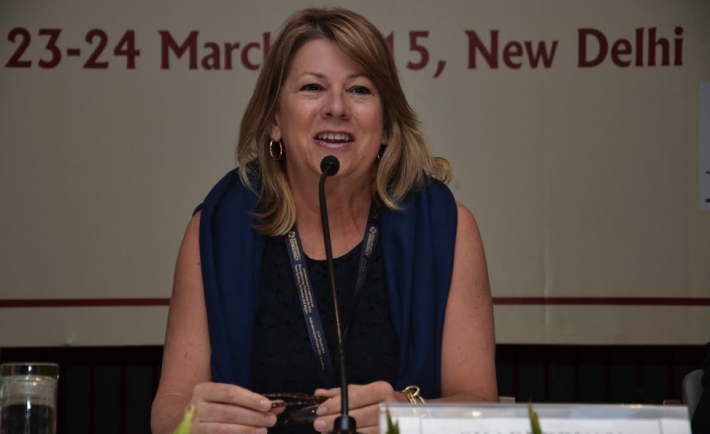
Sandra Pepera, Senior Associate and Director for NDI's Gender, Women and Democracy team.

Cindy McCain and NDI Resident Director Eve Thompson (right) meet with women political leaders in Kinshasha, Democratic Republic of the Congo.
On July 8, the National Democratic Institute’s team in the Democratic Republic of the Congo (DRC) had the pleasure of hosting Cindy McCain in its Kinshasha office. McCain, a businesswoman, philanthropist and humanitarian, is also the wife of U.S. Senator John McCain, who chairs NDI’s sister organization, the International Republican Institute. Mrs. McCain asked to meet with a group of Congolese women politicians to discuss their under-representation in the country’s government as well as the difficulties they face in efforts to participate successfully in the political process.
Barriers to participation are not always obvious to those without a disability, but something as simple as a wheelchair ramp can ensure a citizen's ability to exercise her right to vote. People with disabilities, who comprise 15 percent of the global population, are often blocked from aspects of public life. Efforts to improve the accessibility of physical spaces, such as polling stations and government buildings, are important, but in an increasingly digital age, it is also critical that people with disabilities are able to access and share information online. On June 16, NDI hosted an internal discussion with Nick Bristow, a lead web accessibility developer for the 18F team within the U.S. Government’s General Services Administration. During his discussion with NDI staff, Nick shared concrete skills on how to plan and design an accessible website, and cultivate organizational awareness of the needs of people with disabilities.
The strength of democracy not only varies vastly across countries and regions but can also change rapidly. NDI operates successfully in these changing environments in part by leveraging available knowledge to implement the most innovative and relevant programmatic approaches. As practitioners and researchers develop new theories and techniques to guide international development, NDI’s Citizen Participation team shares these publications with Institute staff. The resources shared last month demonstrate approaches to strengthening democracy through fighting corruption, thinking and working politically, improving service delivery and increasing fiscal transparency.
Advances and reversals generally mark the trajectory of democratic development. But in the political history of Nicaragua over the last decade, there have been only reversals with next year’s elections likely to see the continued erosion of Nicaraguan democracy and consolidation of power by President Daniel Ortega and his Sandinista National Liberation Front (Frente Sandinista de Liberación Nacional - FSLN). But there are voices advocating for greater pluralism. Opposition political parties are small but vocal, and different elements of civil society have advocated for democratic reforms. While their efforts have not yet yielded results, the Nicaraguan government still has the opportunity to move toward greater transparency in the polls before next year's presidential elections.

Jon Gnarr, in his official capacity as mayor of Reykjavik, Iceland. Gnarr, a sketch comedian, was elected in 2009 on satirical platform of providing free towels at public pools, a polar bear at the zoo and a drug-free parliament by 2020.
In the last decade, a proliferation of anti-establishment parties in the Euro-Atlantic region has led to increased numbers of protest candidates elected to local, national and European office. Protest parties reject mainstream politics and incumbency, opting instead for sensational campaigns that often advocate for a single issue. Pirates in the UK or anarcho-surrealists in Iceland make for interesting debates, but what happens when candidates who reject a system become part of it? Recent examples show that citizens will vote for protest candidates to highlight “elephant-in-the-room” issues, but in the long run candidates need to be able to deliver on critical issues to maintain support.

In Liberia, engineer James Kendor explains to Senator Joyce Freeman Sumo how water is distributed to her constituents. Credit: Varney Karneh
In most places where NDI operates, the relationship between citizens and government needs work. Instead of serving citizens, government institutions are often weak, co-opted by elite interests, or ineffective due to corruption and impunity. When government is unable or unwilling to address basic needs, citizens suffer.

Photo Credit: Dan Mason
While the international community of parliaments and parliamentary support organizations has successfully developed international standards or benchmarks for the institution of parliament, far less attention has been dedicated to developing standards for the ethical conduct of individual members. To help fill this gap and to start a global conversation, members of the Open Government Partnership’s Legislative Openness Working Group have drafted Common Ethical Principles for Members of Parliament.
Sudanese citizens gather around NDI-distributed radios in the village of Leer to listen to the Let’s Talk program. NDI distributed thousands of wind-up and solar-powered blue radios in Sudan as part of a two-year program that brought dialogue about national issues to isolated communities.
NDI provides technology services to our democracy programs and political partners around the world, and support to our employees and field offices in 60 countries. The Chief Information Officer (CIO) provides leadership, directs technology strategy and is responsible for overall management of all technology support and programs. The CIO also is responsible for establishing strategic partnerships, identifying opportunities to secure program funding and leading the institute’s information security efforts. NDI is a global organization running production business systems and regularly conducting program activities abroad during non-US business hours, thus this job requires the team leader to be accessible at any time as needed (including evenings and weekends).

Refugee and asylum seeker rights rally in Melbourne, Australia. Credit: John Englart (Takver)
Nearly 60 million people around the world are refugees -- either displaced within the borders of their own country or living in countries not their own, according to a new UN study. Just this year, there were 14 million new internally displaced people, which is an all-time high.
World Refugee Day, which will be observed tomorrow, brings attention to this growing global crisis. While discussions about internally displaced persons (IDPs) often focus on immediate needs, such as food, medical aid and shelter, another need should not be overlooked: democratic participation.

Shari Bryan speaks on a panel on urbanization and the challenges of local government and citizen engagement in New Delhi, March 2015.
Cities, for the first time in history, are now home to more than 50 percent of the world’s population. This is an incredible demographic shift, and in their rise to prominence, urban centers have begun to shape national and global-level discussions. After all, there are now megacities in Asia and Latin America with larger populations than some European countries. These megacities drive more than 70 percent of the world’s economic activity, and some of their local governments are acting across national borders to strike their own trade deals and address climate change issues.